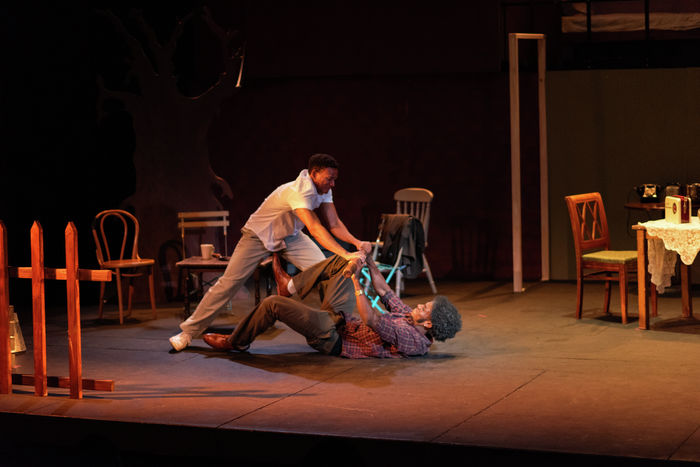The Effect is compelling and complex
This chemical romance delivers outsanding direction and performances

I walked into The Effect on Tuesday night with one question on my mind: will having missed the firework display for this be worth it? And, despite being able to hear the siren song of the distant display, I can honestly say that it was.
The script tells a compelling and complex story, exploring the moral ambiguities of medicating mental health and the rather Cartesian question of whether our personhood really can be reduced to our brain’s chemical and electrical signals, ready for tampering with. The plot centres around a clinical trial for a new psychiatric drug, following the developing relationships of two participants in the trial and the two doctors running it.
“It was an impressively classy and slick production”
It was an impressively classy and slick production. The direction was subtle but clever, giving space for the acting to thrive. Most importantly, director Maya Calcraft and assistant director Daphne Stavride got all the fundamentals right (which is certainly not a given). The dynamism of the blocking was particularly impressive, managing to keep the space active throughout long passages of dialogue. The set was simple and well utilised, giving a convincing answer to the age-old question of black box theatre: how much can you do with two chairs, some boxes, and plain walls? Indeed, this refinement was evident across the production: Jasper Harris’ lighting operated mainly in two states, cleverly juxtaposing the glaring white of an aggressively sanitised hospital environment with a warmer wash for the more intimate moments that fought against this impersonality; Tom Barry’s high-quality sound design immersed the audience in the hospital environment and was clever used to punctuate the dialogue.
Such a dialogue-heavy four-hander rests ultimately in the quality of the acting, however. Thankfully, the production’s prowess wasn’t wasted, and the audience was gifted with four outstanding performances. I could write a whole review just praising Rafael Griso Dryer and Olivia Khattar for their roles as the two participants, Tristan and Connie. Both actors hit every mark, brilliantly capturing the spiritual struggles of two young people trying to understand the nature of love and their place in the world. Khattar’s Connie was touchingly nervous, assertive, caring, doubtful; Dryer’s Tristan effortlessly hilarious, charming, tender. The chemistry that they achieved on stage, especially for an opening night, was totally and utterly astonishing – I have never so wholeheartedly believed in the love of two characters on the Cambridge stage. There are no superlatives sufficient to describe the magic of the abandoned building scene and to be honest, all their scenes together were as perfect as I could reasonably expect. It takes an incredible level of bravery to be as vulnerable as those two were on stage, and the result was truly beautiful.
“The audience was gifted with four outstanding performances”
Audrey Hammer and Jake Leigh were also impressive in their roles as Dr Lorna and Dr Toby, respectively. It is to some extent unfortunate to be sharing the stage with such brilliance, and the doctor roles in the script were far more awkward and unrewarding than the participants. Rather than watching their dynamic develop on stage as we do with Tristan and Connie, the audience gets glimpses, flashbacks, stories, and allusions, from which we have to piece together these characters. This more allusive and obscured approach to characterisation had me teetering between intrigued and confused throughout the play. Leigh captured well the defensive assertiveness of a middle-aged man feeling threatened. Lorna is an unforgiving role with which Hammer did very well, but I missed some of the delineation between the persona the character presented to the patients, to Toby, and in her private moments, which make it hard to understand and connect with the character.
This wasn’t the only time the production didn’t fully overcome the script’s challenges. The second half is structured far more loosely than the first, and once the dramaturgical framework of the trial subsides, unfamiliar audiences become lost as to where they are within the structure of the play. There are seemingly significant revelations in almost every scene, but it becomes increasingly hard to know what is and isn’t important as the frames of reference constantly shift. Until this point, the pacing had been spot-on, with a fine-tuned flow of space and intensity, almost never interrupted by missed cues or line delivery. However, the action needed to slow down in the last act to give the audience time to process the new information being thrown at them, rather than it all piling in an increasingly complicated way.
Ultimately though, these reservations paled in the face of the quality on display from everyone involved in this production. I walked out of the performance feeling so rewarded: inspired by the intelligent directing, stimulated by the complex philosophical questions of the script, and totally overjoyed by the privilege of having watched Connie and Tristan fall in love before my eyes.
 News / SU reluctantly registers controversial women’s soc18 December 2025
News / SU reluctantly registers controversial women’s soc18 December 2025 News / CUP announces funding scheme for under-represented academics19 December 2025
News / CUP announces funding scheme for under-represented academics19 December 2025 Features / Should I stay or should I go? Cambridge students and alumni reflect on how their memories stay with them15 December 2025
Features / Should I stay or should I go? Cambridge students and alumni reflect on how their memories stay with them15 December 2025 Fashion / The art of the formal outfit 18 December 2025
Fashion / The art of the formal outfit 18 December 2025 News / Dons warn PM about Vet School closure16 December 2025
News / Dons warn PM about Vet School closure16 December 2025










